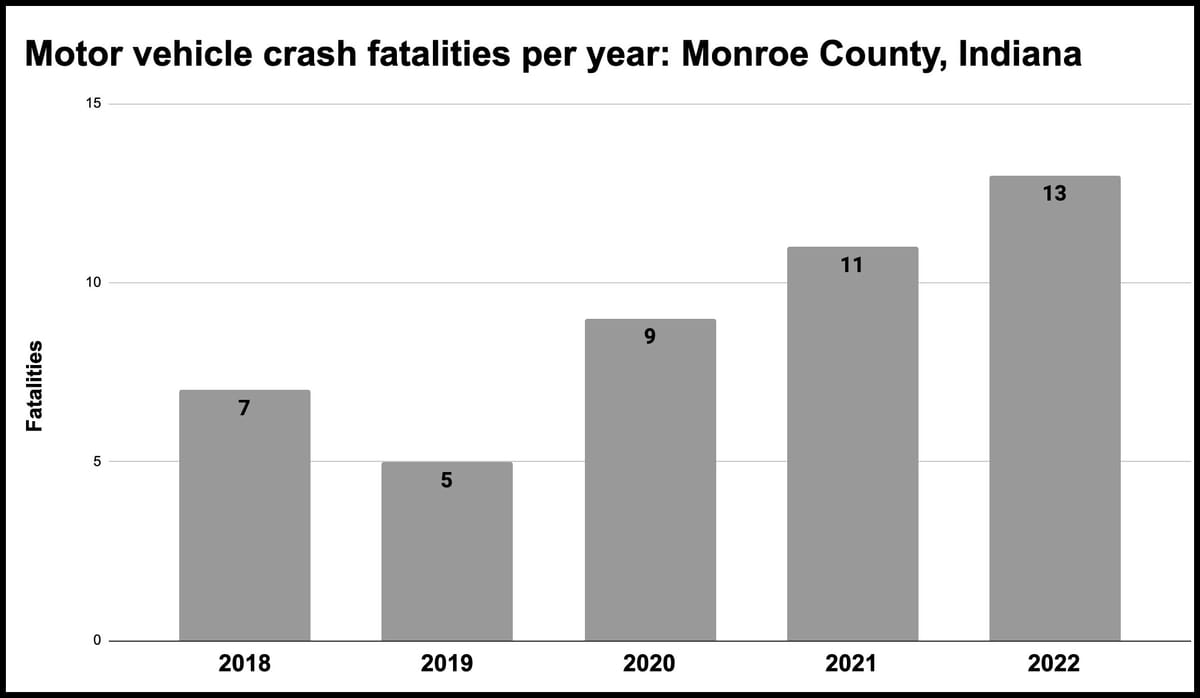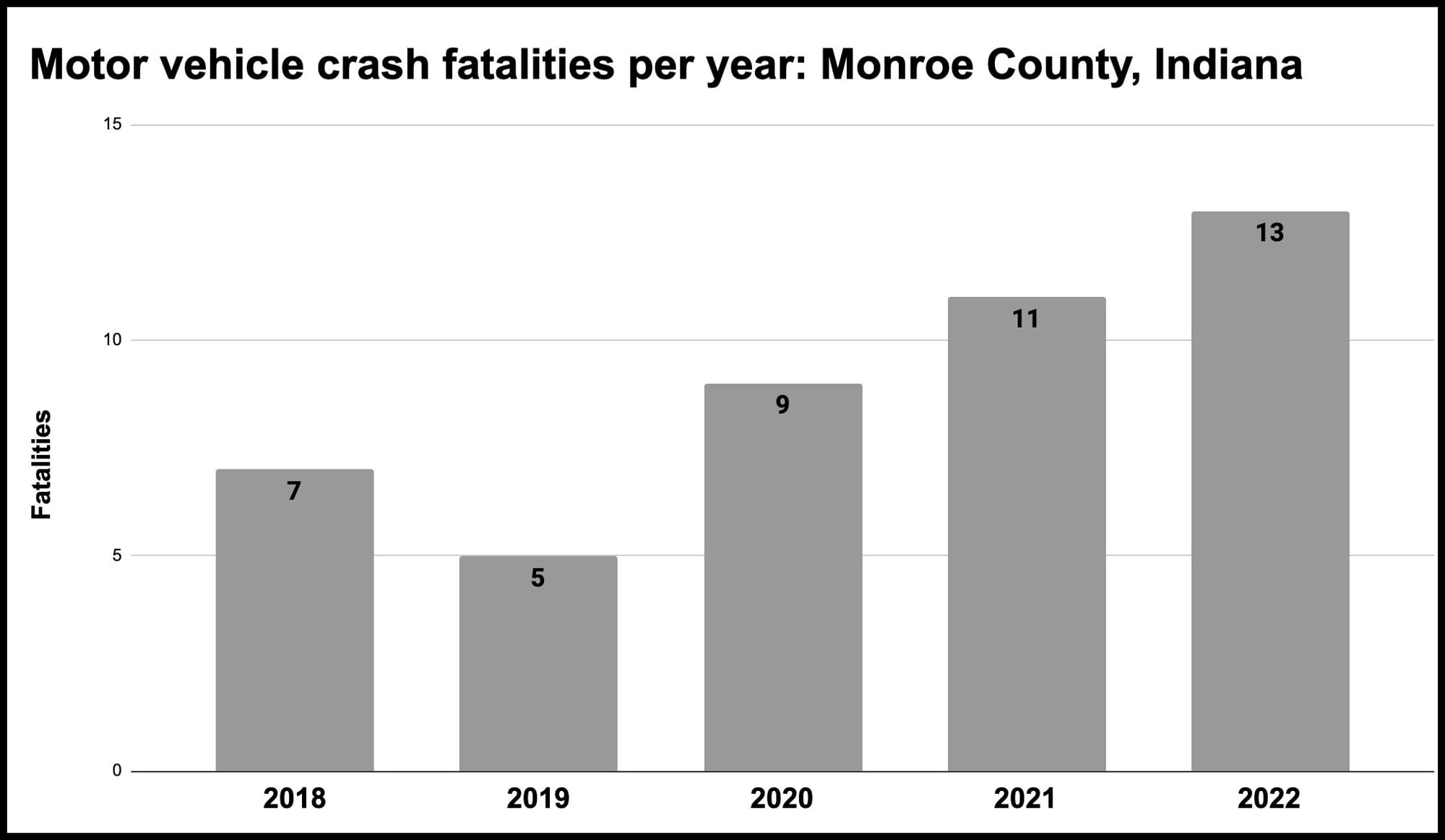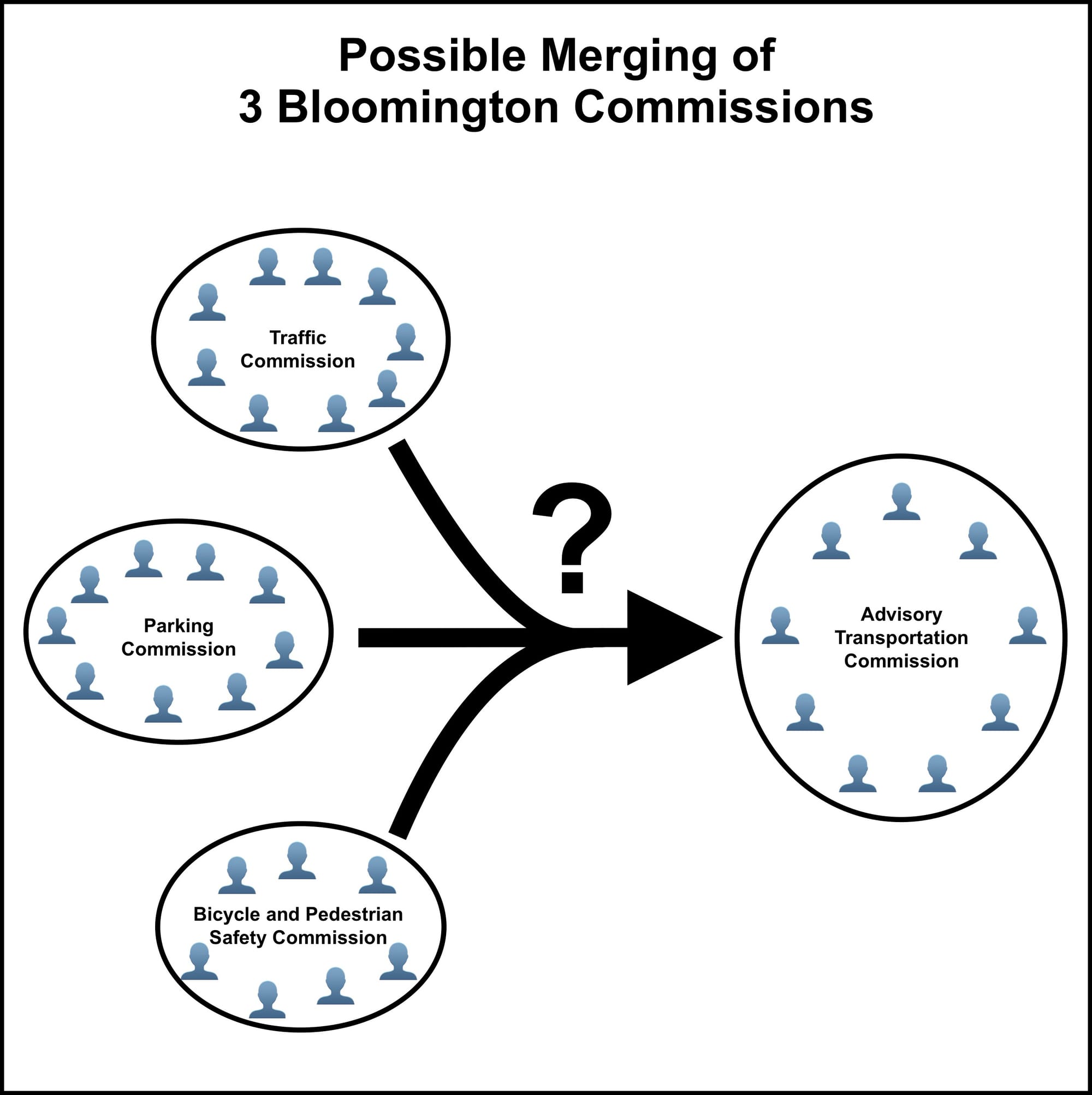Mulled by Bloomington planners: Merging 3 commissions into one transportation-focused group



A consultant’s report delivered to the city of Bloomington almost two years ago, lists out 10 recommendations about the city’s nearly 50 boards and commissions.
The second item on the list is to merge three different commissions: traffic commission; parking commission; and bicycle and pedestrian safety commission.
Last week, Bloomington’s planning services manager Ryan Robling presented a draft three-way merger proposal to the traffic commission and to the parking commission.
The same draft will likely be an item for discussion on the bicycle and pedestrian commission’s next meeting agenda, in a couple of weeks.
In the draft, the name of the new nine-member group would be the advisory transportation commission (ATC).
Robling’s presentation for the idea behind the merger included many of the same reasons given in the consultant’s report.
The Novak Consulting Group noted the considerable overlap in subject matter for the three commissions; the difficulty any one of the groups has in taking a comprehensive view of an issue; the challenge in finding enough city residents to serve on all three commissions; and the burden that the interested public faces in attending the meetings of three different groups, to keep abreast of transportation-related issues.
Not included in the Novak report was the reason that Robling highlighted in his presentation last week—a focus on traffic fatalities.
Speaking to the traffic commission, Robling said, “Currently, there is no community body that has a stated goal of ensuring that the city continues to strive towards the complete elimination of roadway deaths. I see that as a problem.” Robling added, “And I think many community members do agree with that.”
Robling presented the grim numbers for roadway deaths in Monroe County. In the last five years, the trend is mostly increasing: Starting in 2018, for Monroe County, which includes Bloomington, the annual tally of deaths was: 7, 5, 9, 11 and 13. That’s 45 deaths in traffic crashes over the course of five years.
The draft ordinance presented by Robling states “The ATC shall provide recommendations and guidance to the mayor and common council in the pursuit of developing and implementing a city-wide policy to eliminate all transportation-related fatalities…”
The new group’s focus on safety is reflected in the draft strategy for establishing the initial membership of the ATC. Once the ordinance is adopted, a steering committee that has been formed to support the city’s initiative to pursue federal Safe Streets for All (SS4A) funding would provide the initial ATC membership.
In the draft, the initial ATC terms for the SS4A steering committee members would expire on Jan. 31, 2025, about a year and three months from now. From that point forward, the ATC membership would be appointed based on the ordinance, which the city council would have to enact.
Reception to the idea of merging the three commissions seemed generally positive last week—from members of both the traffic commission and the parking commission.
Traffic commissioner Greg Alexander said, “I’m generally in favor.”
The appointments to the ATC include one from the council on community accessibility, the city’s plan commission, and the city council. Alexander said he was “really excited” about those three appointments, because he thinks they will help give the ATC some “actual teeth.”
About the other appointments, Alexander had some concerns. One has to come from the board of public works. Alexander pointed out that there are only three members of that board, all of whom are appointed by the mayor. The appointment could just as well be a general mayoral appointee, he said.
Alexander also expressed some concern that there would be only four members of the general public, unaffiliated with some other board or commission.
Robling stressed that the draft he presented was intended to be considered a draft. “This is a very rough draft,” he said, “And we’re just trying to get everyone’s eyes on it as early as possible, because we want this to be better than it currently is. That’s essentially the goal.”
At the parking commission meeting, Ben Dalton said about the proposal, “I think this is really well put.” He added, “I think there’s a lot of compelling arguments here. And I see a lot of value in helping discussion and decision making.”
But Dalton raised a question about the sheer volume of the work to be done. Dalton put it like this: “I still struggle to see how a [single] committee would have sufficient time, energy and resources to address all of the specific things that each of these commissions are currently accomplishing independently.”
The issue of workload was to some extent addressed at the traffic commission the day before, by commissioner Sarah Ryterband. She noted that meetings of each of the commissions are sometimes canceled, so she figured a single commission that actually meets every month could handle the work of the three commissions.
Based on a B Square count, projecting through the final two months of the year, here’s the breakdown of the number of meetings that will have been held, out of 24 monthly meetings per commission for 2022 and 2023: bicycle and pedestrian safety commission (15); traffic commission (17); and parking commission (16). On average, each commission has held two meetings every three months.
On the parking commission, city council appointee Steve Volan also highlighted safety as a relevant topic. He sees safety issues as a way to distinguish the parking commission from the other two commissions. The parking commission, Volan said, has never been concerned with safety. What the parking commission is concerned with is the economic impact of parking.
“It’s about how it’s priced. Like, it doesn’t matter to us, whether you take spaces out or put them in—it matters, how they’re priced,” Volan said.
Volan suggested that merging the other two commissions makes sense, but as for the parking commission, it might just need support from staff who work in a different department than planning and transportation. He floated the city’s economic and sustainability department as one option.
Robling’s next presentation of the merger concept will likely come at the bicycle and pedestrian commission’s next meeting, which falls on Nov. 13.




Comments ()